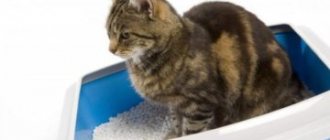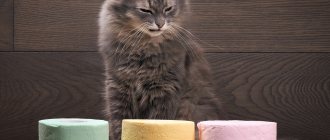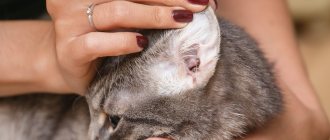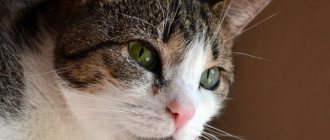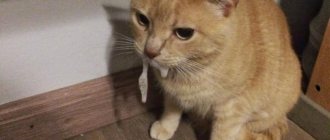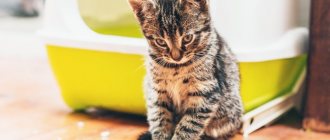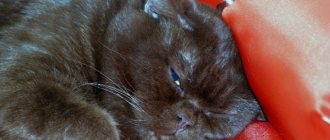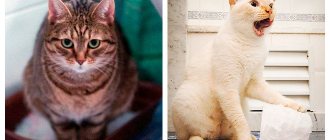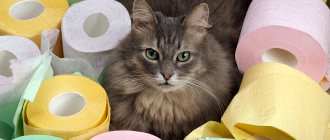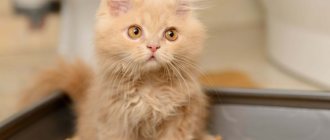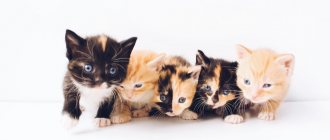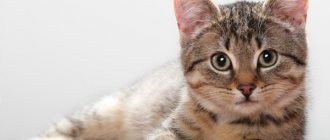Cat health problems always cause concern for a responsible and attentive owner. Among the most common problems is loose stool, which can occur in both a kitten and an adult.
Most often, it is caused by poor quality food or even overeating, which causes diarrhea and indigestion in the cat . Daily fasting, herbal infusions, activated carbon and other simple and safe remedies help cope with the problem.
If your cat has been diarrhea for more than one day, and mucus is clearly visible in the loose stool, you should definitely go with your pet to a good, experienced veterinarian.
ATTENTION! This phenomenon may indicate more serious diseases than indigestion. And it is extremely important not to hesitate, not to rely on the animal’s good immunity.
If a cat has loose stools with mucus for a long time, the body quickly becomes dehydrated, problems with the kidneys, liver, and the functioning of the cardiovascular system will begin, and long-term and complex treatment will be required. In addition, loose stools may indicate dangerous diseases.
Symptoms of diarrhea in kittens
global $ads_google; //data-ad-slot=”2475549904″ $ads_google = empty($ads_google) ? false : true; ?> if ($ads_google == false) {?>
$ads_google = true; ?> } ?>
It is not difficult to determine that a kitten has diarrhea. This is necessary in order to take health measures in a timely manner and prevent serious consequences for the life of the young cat.
So, we determine loose stools in kittens:
- the kitten’s state can easily be considered depressed;
- there are problems with appetite, more often it simply doesn’t exist;
- if diarrhea is prolonged, the animal’s weight will decrease;
- frequent bowel movements;
- dehydration (when taken by the scruff of the neck, the skin then straightens out for a long time);
- loose stools, possible admixtures of undigested food;
- your tummy may be bloated.
In general, it is clear from the baby that he is experiencing discomfort, so it is important to find out what could cause such a disruption of the gastrointestinal tract.
Main causes of diarrhea
Diarrhea is the rapid passage of food through the digestive tract. There are quite a few reasons for this phenomenon:
- animal experience;
- nutritional errors;
- infection;
- parasites;
- allergy;
- fur accumulated in the stomach;
- sickness and poor health.
Let's look at each reason in more detail.
The emotional state of a small animal can tell on its digestion. This may be a reaction to a change of place of residence, the appearance of a new inhabitant or guest in the apartment, and especially gentle cats even react to a change in the tray and sleeping place that has become familiar.
Errors in diet planning definitely cause damage to health. Most often, owners worry about their pet and desperately overfeed it, especially by abusing cat treats. This also includes the kitten eating prohibited foods, such as smoked meats, spoiled food, or changing food.
Infections in the form of panleukopenia, coronavirus enteritis, toxoplasmosis and calicivirus can easily overcome a baby. But the stool will not tell you what exactly is to blame here; if an illness is suspected, the kitten is taken to the veterinarian.
The appearance of parasites in the body is also not uncommon. They can be brought in by people with food and land. Gradually there will be more and more of them, and the kitten will develop diarrhea as a reaction to intoxication of the body. Tape tapeworm and coccidia are especially guilty.
Allergies are also considered among the probable causes of loose stools. It could be your own fur or other irritants; it makes sense to visit a specialist at the veterinary clinic. Particular attention should be paid to kittens of the Somali cat, Pixie-Bob, Norwegian Forest, Maine Coon, Ragdoll: these long-haired beauties tend to swallow clumps of their fur.
When there are health problems, bowel dysfunction is the first thing that appears very often. These are viruses, chronic liver and kidney diseases, reduced immunity. This also includes diseases of the gastrointestinal tract, erosion and tumors.
If you have problems with the gastrointestinal tract, mucus can often be found in the stool.
Poisoning and antibiotic treatment are also factors that affect the quality of a kitten’s stool. First, the intestinal microflora is restored, and then it is observed whether the loose stools have disappeared.
Green diarrhea in a cat
Green diarrhea in a cat in most cases indicates putrefactive processes in the body.
Diarrhea often occurs when intestinal disorders are caused by pathogens. The owner should know that bowel dysfunction is a dangerous symptom.
It is worth finding out why this problem occurs and what to do to help the animal.
Causes
Diarrhea in cats is rare. Various unfavorable factors can provoke the disorder.
There are several reasons that cause stool upset:
- diseases of internal organs of a systemic nature;
- helminthic infestations;
- infectious processes of parasitic, bacterial or viral etiology;
- development of dysbacteriosis;
- violation of metabolic processes;
- formation of neoplasms in the gastrointestinal tract;
- allergic reactions to food;
- liver diseases;
- intestinal obstruction;
- stress;
- poisoning.
Diarrhea can be caused by antibacterial drugs and antibiotics used for a long time.
Pathology in kittens
If a small kitten has green diarrhea, this may be due to several reasons:
- overfeeding;
- consumption of cow's milk, which is considered heavy food for unformed digestion;
- stopping breastfeeding;
- helminth infection;
- development of malignant processes.
In kittens, the provoking factors for greenish diarrhea are protozoal infections (cryptosporidiosis and giardiasis).
In most cases, such diarrhea in a cat indicates putrefactive processes in the intestines, when fermentation of stagnant food occurs. Similar conditions can occur after consuming stale food, low-quality feed, and also when there is an accumulation of a large number of pathogenic bacteria.
Pathogenic microorganisms produce toxic substances, severe intoxication occurs, and the functioning of all systems and organs of the animal is disrupted.
Diarrhea with water
Feces with water most often indicate leukemia, viral enteritis, panleukopenia, chlamydia.
Shades of green
If the feces have a yellow-green tint, then the animal develops a severe helminthic infestation.
A dark green color with bloody impurities or mucus is observed with inflammation of the large intestine, gastrointestinal tract, and severe poisoning.
Diagnostics
If diarrhea develops, the animal must be shown to a veterinarian.
To find out the cause of bowel dysfunction, the specialist prescribes a number of diagnostic examinations, including:
- donation of urine and feces;
- examination under a microscope of feces and scrapings from the walls of the colon;
- X-ray and ultrasound examination of the peritoneal cavity.
The veterinarian must collect all the necessary information regarding what the pet ate, whether any vaccinations were carried out, and whether poisoning is possible.
Only after a complete examination and diagnosis based on the results obtained, appropriate treatment is prescribed.
Therapy methods
For short-term intestinal disorders, medications are prescribed to help eliminate symptoms and maintain the animal’s body.
If only diarrhea is observed, the veterinarian will advise not to feed an adult animal for 1-2 days, and a kitten - for a maximum of 12 hours.
Based on the diagnosis, the specialist prescribes certain types of medications.
To restore the intestinal microflora, probiotics are prescribed: Bifitrilak, Bifidum or Kaopectate.
It is recommended to give activated carbon or Smecta to kittens. Only a veterinarian selects the dosage and timing of treatment .
In case of profuse chronic disorders, it is necessary to give your pet Papaverine. The action of the medication helps reduce intestinal spasms and restores peristalsis.
Sorbents also play an equally important role in eliminating green diarrhea. Enterosgel is often prescribed. It removes toxins, heavy metal salts and other harmful substances that affect digestion from the cat’s body.
To treat an animal at home, it is recommended to use decoctions of chamomile, St. John's wort and oak bark. These plants have an anti-inflammatory and tonic effect.
For a kitten, 2 ml of decoction per day is enough; for an adult animal, the dose is tripled. It is necessary to give the prepared product until stool is completely normalized.
When to contact a veterinarian
It is necessary to immediately show the cat to a specialist in the following cases:
- diarrhea lasts for 1-2 days;
- feces have a liquid consistency;
- the stool contains mucus or bloody impurities;
- feces of an atypical color;
- lethargic state of the pet;
- lack of appetite and desire to drink water;
- regular vomiting, seizures.
The sooner help is provided, the greater the chances of a quick recovery.
Prevention measures
To prevent diarrhea in a cat, you must adhere to simple preventive measures:
- regularly examine your pet for parasites;
- get vaccinations to strengthen the immune system;
- feed only high-quality feed;
- do not change the type of food, which can cause intestinal disorders.
During walks, do not allow your pet to come into contact with street animals, especially homeless ones.
Conclusion
Green diarrhea in cats is an unpleasant phenomenon. This may indicate the development of pathological processes that threaten the life of the animal. When the first symptoms appear, you should contact a veterinary clinic to alleviate your pet’s condition.
PreviousNext
Source: https://nashakisa.ru/zdorove/zelenyj-ponos-u-koshki.html
How long can diarrhea last?
global $ads_google; //data-ad-slot=”2475549904″ $ads_google = empty($ads_google) ? false : true; ?> if ($ads_google == false) {?>
$ads_google = true; ?> } ?>
Duration of diarrhea with a frequency of 2-3 times a day can very quickly lead a kitten to severe dehydration. Replenishing lost fluids at home can be challenging. Duration of up to three days is critical; it is better not to wait so long and consult a doctor.
The kitten has a bloated belly and diarrhea
Bloating with diarrhea is formed due to flatulence, less often due to overeating. This combination is caused by errors in the preparation of the kitten’s diet, which needs to be fed properly. Tender stomachs simply cannot digest adult food! As a result, food accumulation occurs, indigestion leading to diarrhea, flatulence and vitamin deficiency.
Worms also cause bloating; if deworming is not carried out, then this is the first thing that should come to the owner’s mind. If they exist, and the animal is not spared from such “neighbors,” then the death of the baby is quite likely. It is better to carefully study the material about parasites in cats and kittens, and not return to this problem.
If the kitten's tummy is swollen, it is better to go to the veterinarian, who will rule out serious illnesses and advise about loose stools.
What to do
If the cause is overeating, then it is important to adjust the diet itself and the portion size.
When the cause is parasites, then such a baby needs a certain dose of medication, and it should be agreed upon after examination at a veterinary clinic with a specialist. Self-treatment is fraught with violations in dosage and incorrect approach to the treatment regimen.
Flatulence appears as the kitten grows; if the diet is improved, the problem will quickly go away. The combination of loose stools and flatulence is painful; it is better to help the baby with activated carbon or enterosgel, while reviewing the diet. The coal tablet should be cut into 4 parts and mixed with water.
First aid
Loose stool with mucus in a pet is always a problem, even if the diarrhea lasts for a short time. It is necessary to help the animal’s body before it goes to the veterinarian and receives qualified and effective care. What should the owner do to alleviate the condition of the cat?
ATTENTION! The most important thing is to stop feeding, since the next digestion of food will be an additional burden on the body.
The pet needs to be provided with peace, there must be access to the tray without restrictions. If the tray is usually in the toilet and the cat needs to call someone to open the door, then in such a situation it is better to take the tray out into the corridor.
If diarrhea has been going on for some time and the cat’s body is dehydrated, you can inject him with a sodium chloride solution subcutaneously (this drug can be bought at the nearest pharmacy). If your cat has diarrhea, you need to give water often, but in small portions.
After defecation, wipe the anus area with a soft, damp cloth . Cats, despite their cleanliness, will be additionally nervous because of dirty areas of their body.
You can give your pet a decoction of oak or rice, they have a bonding effect. But not every cat will agree to drink such a liquid; you will need to pour a little directly into the mouth with a spoon or a syringe without a needle.
The kitten has diarrhea with blood and/or mucus
If it seems that a kitten’s diarrhea is due to an incorrect diet, then mucus in the stool is an indication that this opinion is wrong. The first step is to understand whether parasites are bothering your pet. It’s hard to believe how many parasites can torment cats, it’s a whole dominance of dangerous neighbors in the body!
If mucous diarrhea is accompanied by vomiting, drowsiness, and apathetic behavior, then there is a possibility of intestinal inflammation.
Bloody diarrhea is less common in kittens. If there is blood in the stool, there are probably several reasons for its appearance:
- poor vascular permeability;
- erosion, intestinal ulcer or perforation.
If the blood comes out directly from the stomach or small intestine, then the diarrhea will be red, and hemoglobin will not be digested in this case. When these are streaks of blood, it means that the problem happened in the large section or in the last segments of the small intestine.
What to do if you have bloody diarrhea
To treat bloody diarrhea in a small kitten, you need to use a diet, as well as eliminate all the symptoms and the causes that caused them. All this happens at the same time.
global $ads_google; //data-ad-slot=”2475549904″ $ads_google = empty($ads_google) ? false : true; ?> if ($ads_google == false) {?>
$ads_google = true; ?> } ?>
It is advisable to donate feces for testing - they will tell you exactly what the reason is.
It is important to understand that losses of potassium and sodium during diarrhea are dangerous, as they lead to disruption of water-salt metabolism, which increases diarrhea. It turns out to be a vicious circle. Requires the introduction of Regidron, Hydrovit, Hydrolyte.
The kitten's diet begins on the first day of treatment, primarily by fasting for no more than 12 hours. After this time, the kitten must eat. During treatment, your child should drink clean boiled water at any time.
When the hunger strike period has passed, you need to start complementary feeding with boiled rice porridge, then add boiled chicken or beef. If all is well, you can add a hard-boiled egg.
When the owner is convinced that the diarrhea has passed, you need to feed the kitten with fermented milk products and Bifidumbacterin.
Prevention of diarrhea
Prevention is based on diet. The food must be constantly fresh and of good quality. You should not suddenly switch your baby to a new diet; do it gradually. Also don't forget about vaccinations.
To summarize, we can say that a kitten can develop diarrhea for numerous reasons, but most often due to poor nutrition. Therefore, proper care and adherence to the diet are the most important preventive measures aimed at a full life and development of the pet.
Diarrhea with vomiting
When, as a result of reflection, the contents of the stomach are thrown out through the oral cavity, we call it vomiting. It is evidence of irritation of the central nervous system - the signal came there from the stomach or intestines, most likely the problem is inflammation, which will be indicative in the presence of concomitant diarrhea.
When in doubt, you need to look at the animal carefully: coughing is different from vomiting. When coughing, the chest works, this is a rapid movement, and when vomiting, spasms of the abdominal wall are visible, the back can also arch, the action can be prolonged and repeated.
What to do for diarrhea and vomiting in kittens
First aid for diarrhea with vomiting is provided at home by the beloved owner. Vomiting greatly depletes the kitten’s strength; in combination with diarrhea, it quickly contributes to the disruption of the water-salt balance, which leads to recurrence of vomiting and loose stools, and it will not be easy to get out of the vicious circle.
The first step is to stop the vomiting. Metoclopramide with a dosage of 0.2-0.4 mg/kg helps with this; the drug can be used 3-4 times a day. This product is in the form of a solution for subcutaneous injection or tablets.
Symptomatic treatment is also carried out with tablets and solutions of ondansetron and dolasetron. Ondasetron is given twice a day at a rate of 0.5 mg/kg. Dolasetron is dosed at 0.6-1 mg/kg and given once.
Vomiting will be stopped by prochlorpromazine and chlorpromazine at a dosage of 0.1-0.5 mg/kg three times a day. Then they look for the cause of diarrhea and eliminate it by carrying out symptomatic therapy.
How to help a kitten with diarrhea: home treatment methods yourself
Digestive dysfunction negatively affects cats, and in severe cases can lead to the need for long-term therapy. Loose stool in a kitten is much more dangerous - a not fully formed organism cannot fight the root causes of its occurrence and requires veterinary care. Ignoring unpleasant symptoms can cause serious dehydration and death of the baby.
Common Causes of Intestinal Disorders in Kittens
Predisposing factors causing the pathological condition include an imperfect digestive system, rapid growth and weak functioning of the immune system.
Kitten and litter box
There are many reasons why a kitten has diarrhea.
Invasive diseases
Helminthic infestations in babies are formed through mother's milk, when licking fur, and are transmitted from a sick individual. Infection can occur on the street, through the bites of blood-sucking parasites, low-quality adult food or raw meat and fish.
Poor nutrition
A sharp change in the baby’s usual menu leads to digestive disorders. In most cases, they occur when a furry pet comes to a new home with owners who are unfamiliar with the rules of nutrition.
Month-old kittens are taken away from their mother and begin to be fed food inappropriate for their age, which is not completely absorbed in the body, its remains fester in the gastrointestinal tract.
Overeating is the second most common source of intestinal dysfunction.
Infectious and non-infectious diseases
Problems with the normal functioning of the digestive tract are caused by:
- bacterial infections;
- influenza, chlamydia, panleukopenia;
- herpes, infectious peritonitis;
- diabetes mellitus;
- malignant neoplasms;
- diseases of the colon, kidneys or liver.
Important! If, along with the main symptoms, the animal experiences loss of appetite and vomiting, then there is a risk of poisoning with toxic substances or swallowing a sharp object. Owners need to take their pet to a veterinarian to identify the source of the disease.
Treatment of diarrhea depending on symptoms at home
Therapeutic measures are carried out depending on the results of a diagnostic examination and identification of the root causes of deviations in the functioning of the digestive system. After completing the procedures, all little pets are recommended to be vaccinated against various infectious pathologies.
Diarrhea in a cat: how to treat it at home
Veterinarian appointment
When using antibacterial drugs, the restoration of the gastrointestinal microflora is carried out with prebiotics and probiotics, specifically intended for veterinary therapy.
Bloody diarrhea
There are several primary sources according to which kittens may develop liquid stool interspersed with blood particles.
These include:
- disturbances in the rate of blood clotting;
- damage to certain areas of the colon;
- accidental consumption of poisons intended for rodents;
- malignant neoplasms in the lower intestinal tract;
- benign polyps;
- allergic reactions to the component composition of the feed;
- helminthic infestations, various infections.
After diagnosing and determining the cause of the disease, the veterinarian prescribes:
- medications that restore the functionality of the gastrointestinal tract;
- antibacterial agents - for infectious etiology of the disease;
- medications against worms - upon confirmation of their presence;
- changing the type of food.
Important! With any therapy, it is necessary to increase the amount of fluid entering the baby’s body. Clean drinking water should be freely available and changed twice a day.
Watery diarrhea
A water disorder occurs when there is too much fluid in the body. The problem may be associated with living in a hot climate, insufficient indoor air humidity, or lack of food - a hungry cat tries to replace food with drink.
The intestinal mucous membranes are not damaged during deviation; the owner must observe the behavior of the animal and the frequency of its approach to the bowl of water. Solving the problem of heat or dry air, increasing the amount of food stops the unpleasant symptoms.
Kitten has green diarrhea
The development of dysbacteriosis leads to the appearance of a green tint of liquid stool. The deviation is provoked by putrefactive bacteria actively multiplying in the intestinal tract. The acute form of the disease occurs under the influence of stale food or during prolonged therapy with antibacterial agents.
What to do if a kitten has diarrhea? The treatment regimen includes:
- taking probiotics - to restore the balance of microflora;
- eliminating spoiled foods from the diet;
- medications - depending on the type of activated intestinal pathogens.
Medicine in a spoon
Important! It is impossible to cure dysbiosis on your own. Products intended for humans are not suitable for the treatment of young cats. The veterinarian must prescribe the drug, calculate the dosage and frequency of administration.
Yellow diarrhea
The appearance of stool with a yellow tint is provoked by:
- severe poisoning;
- blockage of the bile ducts;
- congenital or chronic liver, kidney failure;
- pancreatitis.
Important! If blood particles are observed in the stool (red color of stool), an increased volume of mucus, and defecation is accompanied by the smell of rotting, then the source of the deviation is worm infestation.
Therapy depends on the type of disease, the stage of its development and the general condition of the cat’s body.
Necessary medications
Diarrhea and vomiting in a cat: what to do at home
Therapy methods are selected in accordance with the source of diarrhea.
Injection intended for a kitten
- Severe loss of fluid leads to the removal of useful substances by the body, disruption of water-salt metabolism, and increased peristalsis. To replenish lost fluid, children are recommended to use Ringer's solution with glucose, which is administered orally, intravenously or subcutaneously, depending on the severity of the process.
- Food poisoning is treated with adsorbents: black or white activated carbon, Atoxil, Enterosgel. Normalization of the work and motility of the intestinal tract is carried out by Smecta. These remedies are suitable for mild intoxication of the body - the pathology in case of serious poisoning can only be stopped in a veterinary clinic.
- Gastrointestinal diseases, poisoning, allergic reactions, poor acceptance of a new diet and antibiotic therapy require the prescription of a special drug - Acti-Kat. It is produced in powder and is given to cats along with food or water, one sachet for 5 days. If the problem of loose stool is not solved, then the animal should be shown to a doctor. The drug is harmless and has no contraindications for use. It is not used for serious dysfunction of internal organs or infectious diseases.
- Insertion of blood particles in the stool requires the use of Dicinone injection solution. The medicine is prescribed for ulcerations on the mucous membranes of the intestinal tract, to stop bleeding.
- For bacterial infections, broad-spectrum antibiotics are used. Therapy is carried out with Amoxicillin in tablets or solution for intravenous or subcutaneous administration. Dosage for injections - 15 mg/kg 2 times a day, for oral administration - from 10 to 20 mg/kg, up to 3 times a day.
- For a viral infection, Fosprenil is recommended. It is given to the baby three times a day, 0.3 ml/kg. The product is prepared in a solution for intravenous, subcutaneous, and intramuscular injections.
- For helminthic infestations, anthelmintics are used to destroy parasites living in the intestinal tract. Dirofen paste 20 or Dirofen Plus is suitable for kittens. In the first case, the dose is 1 ml/kg, in the second, 1 tablet/kg of animal body weight.
- For poor digestion, Vayo prebiotic drinks are recommended. They are prescribed in case of overeating, a sudden change in the usual diet, or incorrectly selected food. Drinks are also used for poisoning, weak functioning of the immune system, and after surgery. The product has a good taste and most pets drink it with pleasure. The standard dose for an animal is 30 ml/day. The drug has no contraindications and is safe.
Folk remedies
A kitten's eyes are festering: how to treat it at home
What to do at home if the kitten is diarrhea: to relieve the pathology, you can try alternative medicine recipes.
Treatment of a kitten with infusion
To prepare decoctions and infusions use:
- buckthorn, elderberry;
- medicinal dandelion;
- three-leaf watch;
- sandy immortelle;
- pochechuyny mountaineer, tall elecampane.
The preparation of infusions takes place according to the following algorithm:
- 1 tbsp. l. Finely chopped herbs are poured into 0.2 liters of fresh boiling water.
- The mixture is kept in a water bath for 20 minutes.
- After cooling to room temperature, filter and squeeze out the medicinal herb.
- The volume of the drink is increased with warm water to 200 ml.
The preparation of the decoction is done according to the following scheme:
- 2 tbsp. l. The crushed medicinal plant is placed in an enamel bowl.
- Pour 0.5 liters of boiling water.
- Keep for half an hour in a water bath.
- Cool and filter.
Prepared drinks are given to animals 15 minutes before feeding, four times a day.
The first procedure is carried out in the morning - the owner must monitor the pet’s reaction to the new medicine. If the cat's eyes begin to water, she sneezes, rubs her nose and coughs, then therapy is interrupted due to the development of an allergy.
What to feed a kitten with diarrhea
After the first symptoms of intestinal dysfunction, feeding stops for 12 hours. The pet should have free access to water - if he cannot drink it on his own, then the owner should regularly help him with a bottle or pipette. Dehydration is a serious problem with the disease, which, if ignored, can end disastrously for the baby.
Ban on raw meat
It is forbidden to use any dairy products - most bacteria thrive in a nutrient medium of coagulated protein. The same conditions apply to foods with large amounts of carbohydrates and starch, and raw meat. The affected gastrointestinal tract is unable to digest them.
Feeding after a fasting diet begins after 12 hours. You should not feed more than a quarter of the usual volume at one time. The basis of nutrition is:
- poultry white meat, chopped using a blender;
- broth made from lean meats;
- boiled rice cooked in water or broth.
Veterinarians advise not to indulge in culinary delights, but to use special products for cats with gastrointestinal problems. Wet food and pates are ideal, and if using pellets, ensure that you have enough to drink. If the cat has previously eaten products from another manufacturer, then the transition to the standard menu is carried out by gradually replacing one type with a second.
Medicinal feeds are prescribed for any pathologies of the gastrointestinal tract. They provide all the nutrients necessary for a full life and have a beneficial effect on the body in case of pathologies.
If medications for diseases cannot be used without the recommendation of a veterinarian, then specialized nutrition will not cause harm.
Common lines of food for animals with gastrointestinal dysfunction are manufactured by Royal Canin, Health, and Purina.
Why is diarrhea dangerous for kittens?
The main problem with pathology is global intoxication of the body and massive loss of fluid. Prolonged dehydration is often fatal due to:
- removal of vitamins and minerals, beneficial microelements;
- metabolic disorders;
- changes in acid-base reactions;
- problems with electrolyte balance;
- malfunction of internal systems and organs.
Attention! The consequences of diarrhea are manifested by decreased activity, lethargy, indifference and apathy in children.
If a cat is not able to eat and drink on its own, then it requires professional care at a veterinary clinic.
The further prognosis of life depends on the original source of the disease. Pathologies in which it is enough to limit the diet or use the simplest therapeutic methods give a high percentage of recovery. In other cases, owners face long-term treatment for their furry pet, which does not guarantee a successful outcome, especially in advanced forms of the disease or malignant neoplasms.
If the kitten continues to scratch for more than 24 hours, this situation requires an immediate visit to the veterinarian. You should not bring the situation to a critical point and then expect miracles from veterinary medicine.
After recovery, you need to monitor the animal and its reaction to the food for a month.
Not all pets easily cope with the consequences of diseases; some require therapeutic nutrition and periodic veterinary examinations for six months.
Source: https://gafki.ru/koshki/ponos-u-kotenka.html
If the diarrhea is black
global $ads_google;
//data-ad-slot=”2475549904″ $ads_google = empty($ads_google) ? false : true; ?> if ($ads_google == false) {?> $ads_google = true; ?> } ?> Mustard-colored liquid feces in kittens is normal, but the black color called “melena” is not at all present. This is evidence of problems in the body, unless, of course, there are preparations containing iron in the diet, or there is an excessive amount of raw meat or blood meal.
The list of diseases associated with red-black diarrhea is long; you cannot cope with this on your own; consult a doctor.
Budget food
When you want to have a purebred cat, you need to realize that such a pet will require certain financial expenses. He will need ready-made food of at least premium class or always fresh natural food from quality products.
Feeding a kitten or an adult cat with economy-class food is dangerous, it contains practically no meat, and a cat, as a predator, needs this product. Protein is most important for feline nutrition; fiber should be present in the diet in small quantities.
Economy-class food contains cereals, but their coarse particles will greatly irritate the intestines and its lining, increasing peristalsis and causing diarrhea. With flakes of food with a large amount of grain, epithelium comes out, which looks like mucus in loose stool .
When eating natural foods, you should also be careful about the choice of products and monitor their freshness. You can’t keep them in the refrigerator for a long time; even such storage reduces their quality and nutritional value. Foods left in the refrigerator for a long time can develop a fungus that can cause cancer.
The kitten has yellow diarrhea
If the diarrhea is yellow in color, then the kitten’s feces move too quickly towards the exit, but there may be enough reasons for this, namely the presence of:
- infections;
- worms;
- allergies;
- lactose intolerance.
Normally, bile with yellow bilirubin should enter the intestines. As stool passes through the intestines, digestive enzymes cause bilirubin to turn into brown stercobilin. With diarrhea, peristalsis is disrupted and increased, so the transformation process does not occur.
In addition, the kitten may have jaundice, in which case there is too much bilirubin in the stool, which is why it is yellow.
How to treat
Here's how to help a child with diarrhea of this color: first you should take a blood test and check the liver. At the same time, the cat’s diet is adjusted to normalize stool quality.
Kittens are not allowed out of care at first, because this causes dehydration, which can end in the most disastrous way. The water should be nearby, clean and fresh! Drink only boiled water to avoid the development of secondary infection.
Each act of defecation should end with washing the base of the tail with soapy warm water - bilirubin can irritate the skin. And if helminths are added to everything, then in this way the owner washes off their eggs.
If you are overfeeding your cat, you can add pumpkin puree to the food, the dosage is a teaspoon, three times a day.
Vaccinations for diarrhea cannot be carried out, even if the calendar date has come!
Treatment
ATTENTION! In the normal state of the body, mucus should not be visible in the stool. If it is noticeable, this indicates an inflammatory process.
The doctor can decide how to treat the animal after examining, examining the cat, and conducting the necessary tests. What does the veterinarian prescribe before determining treatment? Blood tests, stool tests, ultrasound are performed, and in some cases x-rays are also prescribed.
Diarrhea can also be caused by a foreign object, in which case surgical intervention is necessary.
- If diarrhea is caused by a poor-quality product, a sudden change in food, or intake of milk, antidiarrheal drugs are prescribed. Sometimes antibiotics are also needed. The cat will also take probiotics. If you follow all the specialist’s recommendations, you can quickly achieve recovery for your pet.
- But diarrhea can have serious complications, such as dehydration, intoxication, cardiac dysfunction, and hypovitaminosis. The doctor must also prescribe medications to eliminate these complications.
- To increase the vitality of a cat or kitten, hyperimmune drugs can be prescribed; they also eliminate viral infections.
If you do not pay attention to the consequences of diarrhea, it can lead to death. You need to react especially quickly when your pet has stool with mucus and blood, which may indicate internal bleeding or cancer.
Foul diarrhea
If the cat was treated with antibiotics, then there may be a side effect in the form of foul-smelling diarrhea. This is an indirect sign that the medicine was chosen incorrectly. The veterinarian should decide this.
Sometimes there are no antibiotics, but the diarrhea still smells bad. This means that the food is of poor quality; you need to help the baby with a little fasting.
Treating a kitten for diarrhea at home
Let's talk about those cases when you can carry out treatment and adjustments at home yourself.
Treatment of newborn kittens
The normal state of the kittens’ body allows the intestines to function as expected, therefore, their feces can be mushy or shaped, yellow or mustard in color. Defecation can be seen up to 4 times a day. From this it follows that diarrhea will be considered liquid, semi-liquid and foamy consistency with a different color palette: black, red, green feces, as well as feces with the presence of gray mucus, helminths and their eggs.
If the cause is a bacterial infection, then you need to take antibiotics, and if the infection is viral, then, accordingly, an antiviral drug.
Worm infestation is treated with anthelmintics, allergies with antihistamines.
What to feed newborn kittens
Symptoms in newborn kittens increase quickly; it is not always possible to immediately seek qualified help - first aid is needed immediately. The cat needs to be given the drug “Smecta” or “Enterosgel”, they will remove toxins.
In case of severe stool upset, you can treat your baby with loperamide at the rate of 0.1 mg per 1 kg of weight.
If there is noticeable dehydration, you need an injection under the withers of Ringer-Locke drug or saline solution. In total, pour no more than 3 ml.
Useful information: How to give an injection to cats
Treatment of a one-month-old kitten
Symptoms of diarrhea in a one-month-old baby will include frequent loose bowel movements with an uncharacteristic odor and color. In the absence of high body temperature or pathological impurities in the stool, you can be treated at home, but otherwise you should take the patient to the doctor.
The first step is to remove from the menu the food that supposedly became the catalyst for diarrhea. You will have to remember what the baby ate in the last days before the illness. Especially if something new was introduced into complementary foods.
global $ads_google; //data-ad-slot=”2475549904″ $ads_google = empty($ads_google) ? false : true; ?> if ($ads_google == false) {?>
$ads_google = true; ?> } ?>
Often, diarrhea at this age is only a reaction to the abrupt weaning of the mother cat with a change to fermented milk food, or cow's milk. Food for adult cats will cause the same reaction.
You should not feed your little cat food from the owner’s table, namely meat, fish, sausage, which is what you usually want to pamper your pet with. At this age this shouldn't happen at all.
What to feed kittens at 1 month
You can make the cat starve for up to 12 hours, and then they begin to feed the rice broth, namely the liquid in which it was boiled. You can give your baby Smecta and Enterosgel, but it is important to follow a diet.
It is important to provide the young body with peace: do not insist on games or frighten it with loud sounds. Stress is not the best help at this time.
Treatment of kittens at 2 months
When a kitten is two months old and suffers from diarrhea, this is often due to a change of place of residence - older cats are given to new owners. But they, in turn, are not very well prepared for such responsibility and have not clarified for themselves all the subtleties of the issues of feeding a pet.
The first thing that should come to mind is stress. For a small cat, this is a change from the familiar world to a new environment, new people, so the body can react in a similar way. It is important to make the new tenant feel that he will be comfortable, calm and happy here.
You can immediately take the baby to a cozy corner, where he himself would begin to master his future possessions. Adaptation will happen faster, diarrhea will be quickly forgotten.
What to give a kitten at two months
If the reasons are more significant, then you can relieve intestinal spasms with papaverine. You also need to thoroughly find out what diet the previous owners followed - if a different diet is planned, then the transition to it should be as smooth as possible.
Diarrhea in three month old kittens
Three-month-old male cats are already bundles of energy and strength, but diarrhea can overtake them too. The reasons may be overeating, eating dangerous substances, or the process of deworming.
Naturally, each body can react in its own way to getting rid of parasites, the main thing is that the loose stools are not prolonged.
Treatment of diarrhea in kittens at 4 and 5 months
When a cat reaches four months, he may already suffer from diarrhea, like his adult counterparts.
Stress can be cited as a cause if:
- a visit to the veterinary hospital took place;
- new pets have settled in the house;
- children showed excessive activity in games;
- there are fears of loud objects and sounds;
- a move to a new place of residence took place;
- it was a long road;
- the menu has changed;
and also if there are diseases of the gastrointestinal tract.
global $ads_google; //data-ad-slot=”2475549904″ $ads_google = empty($ads_google) ? false : true; ?> if ($ads_google == false) {?>
$ads_google = true; ?> } ?>
For 4-5 month old cats, individual treatment is prescribed, but first an examination is carried out to identify significant health-related causes.
Eating disorders
Owners try to feed purebred cats and cats correctly, in a balanced manner, choosing special food or a diet made from natural products. And this approach is competent and allows you to maintain the beautiful appearance of the animal and its good health.
But sometimes there is a desire to give your pet an extra portion or feed him something fried or delicious pastries. The digestive system, not ready for such changes, malfunctions, food cannot be digested normally, and as a result, diarrhea begins.
Loose stools can also be caused by food that seems safe for cats, such as milk or raw river fish. The causes of diarrhea are varied, but most often veterinarians have to deal with overeating of a pet, which was facilitated by the owner’s desire to pamper the pet.
Food is poorly digested, putrefactive processes occur on the mucous membranes of the intestines, which is why the epithelium comes off, from which mucus is obtained.
Diarrhea can also be caused by a sudden change in the brand of food. Both manufacturers of ready-made food and veterinarians recommend gradually introducing a new type of food, stretching the transition process over several days.
ATTENTION! There is always a risk of diarrhea when switching to a lower quality feed. Manufacturers of budget food may not adhere to the necessary rules of technology, and the body of an animal accustomed to good products will certainly notice a change for the worse.
Medicines and dosage for diarrhea in a kitten
There is a list of medications for loose stools tested by veterinarians and cat lovers.
| Medicine | Application |
| Activated carbon | For diarrhea without serious symptoms. If the baby’s condition is good, then one activated carbon will probably be enough as a medicinal component. |
| Smecta | Secures the chair well. It is safe for the baby's health, but the dosage must be observed correctly. |
| Loperamide | Not the very first remedy, since this is a medicinal product aimed at human use. Dosage accuracy is important. |
| Enterosgel | This is also a drug developed for people, but it also turned out to be useful for the cat’s body. Enterosgel is literally an ambulance for getting rid of toxins during diarrhea, infections, and poisoning. It is best to give the medicine at the first symptoms of the disease. |
| Antibiotics | There are various drugs that inhibit the development of the bacterial sphere; glycopeptides are popular groups; aminoglycosides; chloramphenicol. Only a veterinarian can prescribe such a remedy, indicating the dosage and regimen. |
| Enterofuril | The medicine is not given to the cat until 1 month, after which it will seem magical, because diarrhea can go away in a short time. The suspension is recommended for use by kittens as a more moderate remedy for such a small body. |
What to feed a kitten with diarrhea
A hunger strike is a hunger strike, but you still need to feed the baby something. After a 12-hour break in nutrition, you need to start giving the baby food. If the kitten is small and very weak, you will have to feed it with a pipette or from a bottle.
The main task will be to prevent dehydration!
The transition to a normal diet (healthy!) is carried out gradually: you need low-calorie, low-fat food. It will be possible to feed the cat chicken broth, kefir, boiled eggs, rice porridge, and minced chicken, but not all at once on the same day.
If the condition worsens, the animal is taken to a doctor. If recovery is noticeable, then kefir is included in the diet. The diet is not changed for a while, only gradually adding other foods. Milk is completely excluded, as is fried, smoked, and fatty milk.
